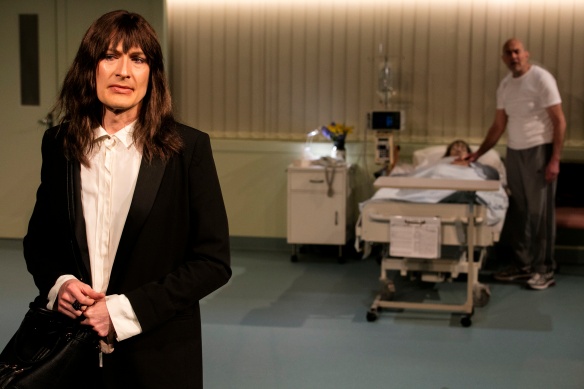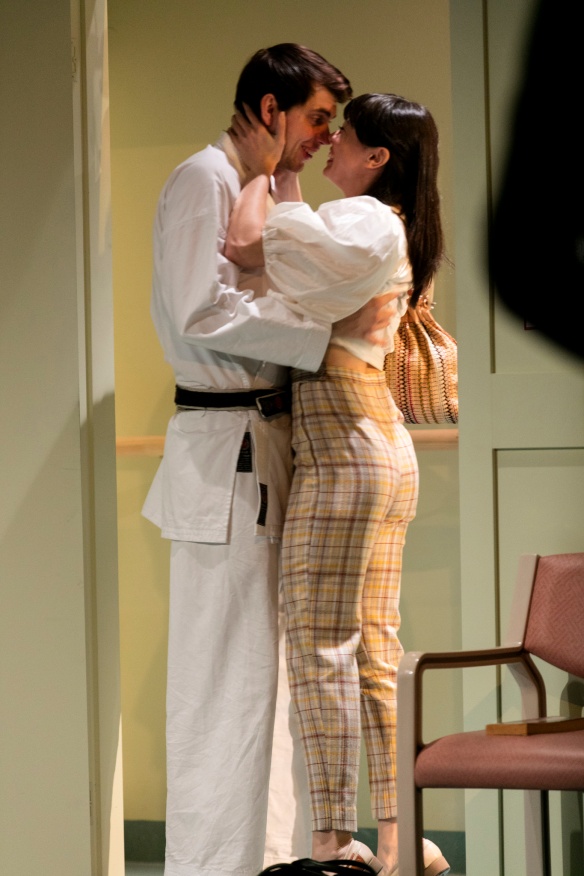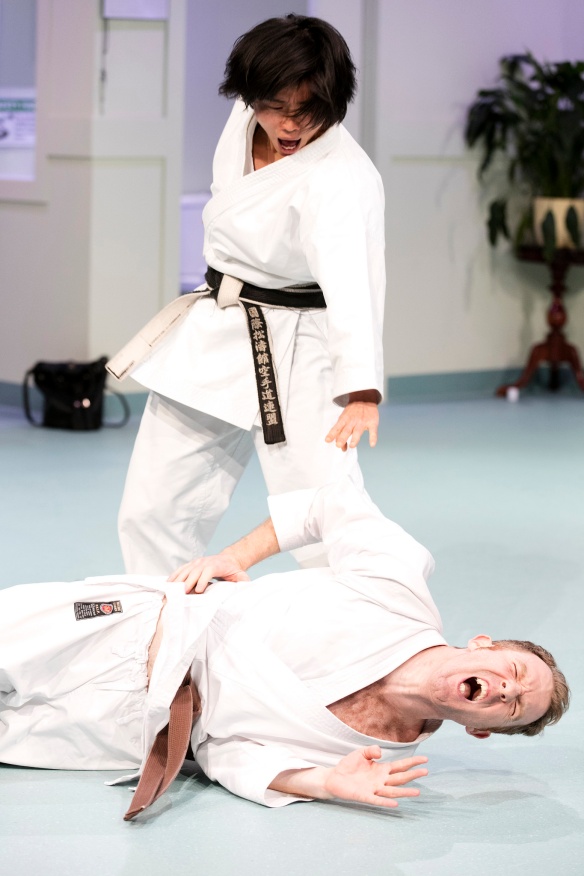Belvoir St Theatre, June 22

Luke Mullins as Patti and Brian Lipson as Danny. Photo: Brett Boardman
All writers inevitably draw on their own experience but some do it more directly and consciously. Playwright Lally Katz frequently draws on her own life and family for inspiration and then mixes in fantasy and dashes of magic realism.
In her latest play, Back at the Dojo, she draws on stories that she heard as a child about her father’s involvement with a karate dojo in Trenton, New Jersey (where she was born). There, a tough Japanese sensei helped him recover after almost blowing his mind with hallucinogenic drugs as a young man in the late 1960s. It was at the dojo that Katz’s father Danny met her mother Lois.
In telling her father’s story, Katz makes no bones about her appropriation, calling the characters Danny Katz and Lois – though there’s plenty of fiction mingling with fact. For starters, in the play her mother Lois is dying in hospital, while the real Lois was very much alive and well at the Belvoir opening night.
Katz has also drawn on another experience for the play. In 2010, when she and Kohn began talking about Back at the Dojo, she happened to meet a New York woman on a bus who revealed that she had been born a man but was now transitioning to the woman she always knew herself to be.
That story inspired a fictional character, Danny’s grandson Patrick, now a woman called Patti in honour of Patti Smith. The two inspirations weave around each other to create the play.
Commissioned by Melbourne indie company Stuck Pigs Squealing and co-produced with Belvoir, Back at the Dojo begins in an Australian hospital room where Lois lies in a coma. Danny (Brian Lipson), now in his 70s, doesn’t accept that she is dying and refuses to leave her side or sleep. Instead he sits holding her hand or moves through a karate routine to help keep his sanity.
Into the room storms Patti (Luke Mullins), who hasn’t been in contact with her grandparents for two years and who was still Patrick last time Danny saw her. An emotional mess having just been dumped by her boyfriend Rex, Patti is uptight, petulant, anguished, still struggling with who she is, still disappointed in life and tripping on LSD.
As she and Danny try to connect with each other again, the past invades the hospital room, rewinding to follow Danny as a young man (Harry Greenwood): his difficult relationship with his own father (Dara Clear), his hippie drug-taking in Kentucky, his recovery at the dojo and his relationship with Lois (Catherine Davies), the sister of Jerry (Fayssal Bazzi), a gentle young man at the dojo whose progress is held back by his club foot.

Harry Greenwood as the young Danny and Catherine Davies as Lois. Photo: Brett Boardman
Interestingly, rather than staging the scenes from the past as if the older Danny is reliving his memories – which would make more sense in straightforward narrative terms – Lipson’s Danny remains oblivious to them until the very end. Instead, it is Patti who watches the past unfold, initially as if the scenes are part of a drug-induced hallucination, then memories of stories she has heard since childhood. Eventually the two worlds and time frames merge.
Katz certainly knows how to spin a compelling yarn and her writing has a lovely ease and flair to it. She is able to inject humour into pain and heartache without undercutting the poignancy of a scene though the the play does feel a bit over-egged emotionally towards the end. Jerry’s fate doesn’t have enough of a lead-up and Patti’s anguish begins to feel overwrought. But the performances keep it feeling real.
Mel Page’s detailed, naturalistic set design of an open hospital room makes the Belvoir stage look as big as it ever has. A large window along the back wall, looking out onto the hospital corridor, is cleverly used for various scenes from Danny being harassed in Kentucky to a beautiful image of the sensei slowly rising as she sings to Patti’s frenetic dance to a pounding song by her namesake, staged with a surprise twist.
Kohn directs a fast-paced, fluid production, while Jethro Woodward’s music and buzzing, electronic sound design is very evocative in underpinning emotion, tension and a sense of mystery.
Early in the development of the play, Kohn brought a Melbourne-based sensei called Natsuko Mineghishi into the project and Katz started training with her as part of her research. A diminutive but commanding presence, Mineghishi plays Danny’s sensei on stage and makes the theme of discipline and honour tangible.
Having a real sensei there leading a fair amount of karate (having trained the cast in the basics with a class each day during rehearsals) gives the play a visceral physicality and exhilarating energy. The crack of Mineghishi’s bamboo cane across the younger Danny’s body makes you wince, while a fight between the sensei and a brown belt is thrilling.

Natsuko Mineghishi and Dara Clear. Photo: Brett Boardman
The performances are excellent across the board. Lipson’s accent feels a little wayward but he anchors the piece as the older Danny. Mullins plays Patti as if every nerve ending is exposed, hands tremoring, eyes and nose dripping in the grip of engulfing emotion.
Greenwood has enormous charm as the younger Danny and the chemistry between him and Davies as Lois really sparks. The rest of the cast do a terrific job in several roles apiece. Bazzi is touching as the gentle, unhappy Jerry, Sharri Sebbens exudes a warm, positive energy as the kindly nurse, Lois’s rambunctious sister Connie and a mysterious old man, while Clear is Danny’s conservative, judgmental father as well as a redneck Kentucky farmer and an unsympathetic karate brown belt.
The two stories of Back to the Dojo may not totally come together and the play may verge on melodrama at times but it weaves a powerful spell and moved me to tears.
Back to the Dojo plays at Belvoir St Theatre until July 17. Bookings: www.belvoir.com.au or 02 9699 3444

Pingback: Jo Litson | Theatre Now